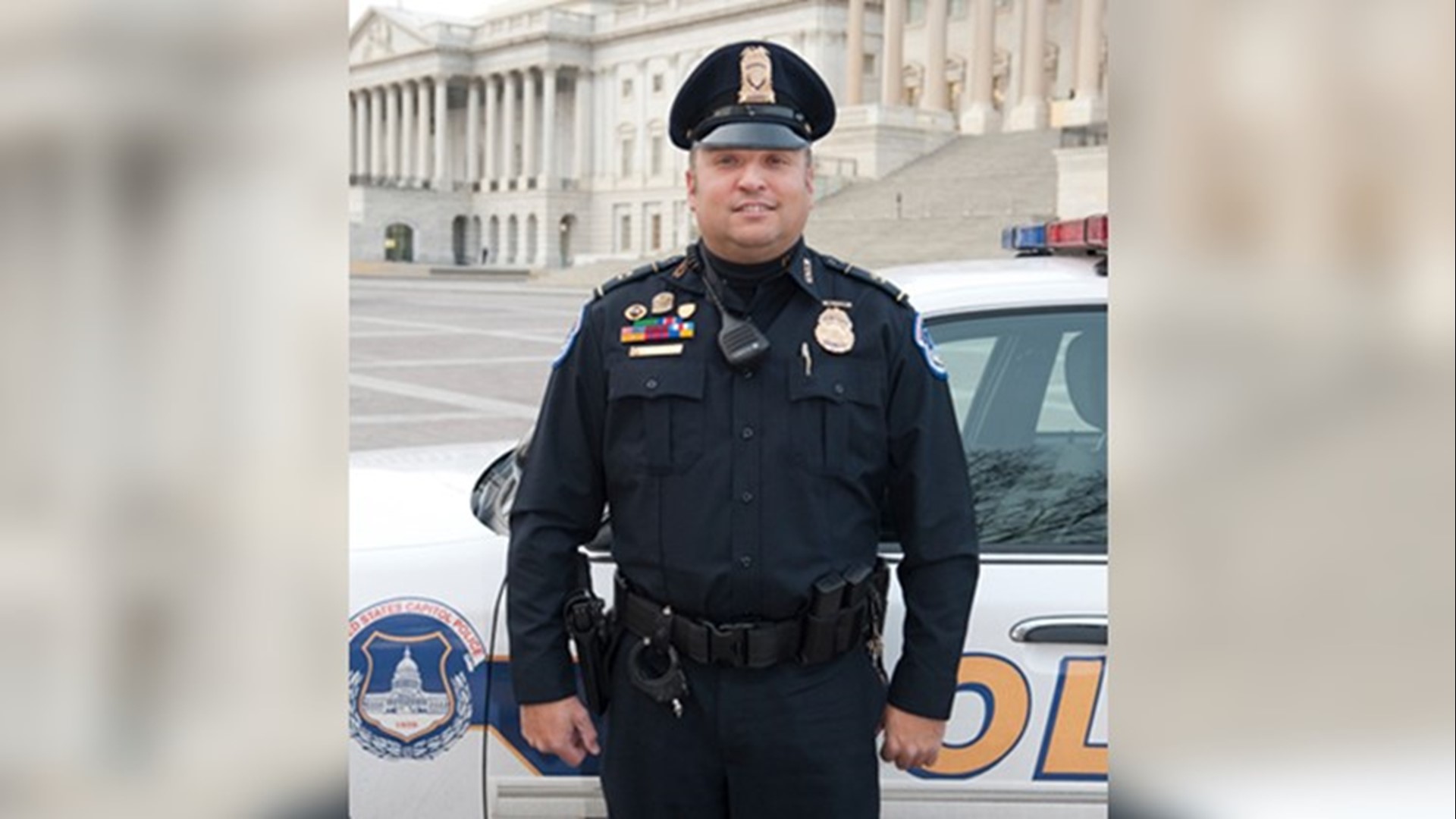WASHINGTON — A former U.S. Capitol Police officer who warned a Jan. 6 rioter to take down an incriminating Facebook post was sentenced to two years of probation and a period of home incarceration Thursday.
In October, a jury convicted Michael Angelo Riley of one felony count of obstructing a grand jury for deleting Facebook messages to a Virginia man named Jacob Hiles who entered the Capitol during the riot. The jury deadlocked on a second felony count of obstruction related to a message from Riley that Hiles should delete a potentially incriminating Facebook post. The Justice Department decided not to retry Riley on that count. Hiles, a Virginia Beach charter fishing captain, pleaded guilty to a misdemeanor count of parading, demonstrating or picketing in a Capitol building in September 2021 and was sentenced to probation.
Riley appeared in court Thursday before U.S. District Judge Amy B. Jackson, who sentenced him to two years of probation with four months of home incarcerations and a $10,000 fine. Riley was also ordered to complete 150 hours of community service.
Before delivering her ruling, Jackson told Riley his actions were "completely contrary to law" and that she did not believe his testimony at trial that he was not thinking of a grand jury when he deleted his messages with Hiles.
"Your trial testimony lacked any reflection or perspective," Jackson said. "I don't know if you were lying or you've just come to believe the fake story you've been selling, but it wasn't credible."
Riley spoke briefly, saying his actions were "stupid and reckless" and apologizing to his fellow officers and his family for tarnishing his years of service.
Although Riley had not met Hiles prior to Jan. 6, they had become Facebook friends days earlier due to a mutual interest in sportfishing. A day after the riot, Riley sent Hiles a private message.
“Hey Jacob, I’m a Capitol Police officer who agrees with your political stance,” Riley wrote in the message. “Take down the part about being in the building they are currently investigating and everyone who was in the building is going to [be] charged. Just looking out!”
The two continued to message back and forth for approximately two weeks until Riley abruptly cut off communications and deleted all but his final message to Hiles – purportedly because he’d just seen a video of Hiles smoking marijuana in the Capitol. In their sentencing memo, prosecutors described the message as an “elaborate and false narrative.”
“Defendant feigned that he was ‘shocked and dumbfounded’ by a video had had seen the night before,” prosecutors wrote. “In reality, as Defendant knew when he fabricated that false narrative, Defendant had known for more than a week that Hiles had been inside the Capitol illegally, ‘smoking weed and acting like a moron.’ Defendant’s thinly-veiled cover-story was the only message to Hiles that remained in Defendant’s Facebook account when the FBI executed a search warrant.”
Prosecutors, who asked U.S. District Judge Amy B. Jackson to sentence the veteran police officer to two years in federal prison, argued the message and the testimony he offered on the stand showed his “contempt for the criminal justice system.” During trial and in their memo, they said Riley betrayed the oath he swore and the “25 years of public trust placed in him as a Capitol Police Officer.”
The Justice Department’s sentencing ask for Riley stood in contrast to the one year of probation recommended by the U.S. Probation Office. His attorney, Christopher Macchiaroli, highlighted that difference in a heated response that described prosecutors’ request as “unjustified, unnecessary and completely inconsistent” with the facts in Riley’s case.
“Apparently, the loss of his honorable career, national headlines of his prosecution, the loss of his health, and the restrictions that accompany a felony conviction are not enough for the prosecutors, because they want him to serve years in a federal prison,” Macchiaroli wrote.
Macchiaroli criticized the emphasis on Riley’s alleged fabrications on the stand – he has never been charged with perjury – and argued prosecutors were seeking an overly punitive sentence because they disagreed with Riley’s conservative political beliefs.
“No matter how outraged the prosecutors are that Officer Riley reached out to Hiles or shared similar ‘political beliefs’ with him this Court does not punish opinions or views, it punishes criminal conduct,” he wrote. “Officer Riley should be sentenced only as to what he did and what the jury convicted him of in this case, and nothing more.”
Macchiaroli also said the government “cannot bring itself to acknowledge” Riley’s long career of service – including on Jan. 6.
“In summary, he responded to pipe bombs, set up a command center on site, ran his K-9 around various locations surrounding the Capitol and subsequently at the Capitol later that evening when order had been restored. Officer Riley also left his post and raced to the Senate side of Capitol Hill to attempt to provide aid to a downed officer,” Macchiaroli wrote.
Ultimately, Jackson's sentence landed closer to the defense's position. She said she weighed heavily the serious medical complications Riley had developed since his arrest, and also described his offense as a novel crime that neither he nor anyone else was likely to repeat. She granted a request from Riley's attorney that he be allowed to leave home on a limited basis during his incarceration period for part-time work as a boat salesman.
We're tracking all of the arrests, charges and investigations into the January 6 assault on the Capitol. Sign up for our Capitol Breach Newsletter here so that you never miss an update.

